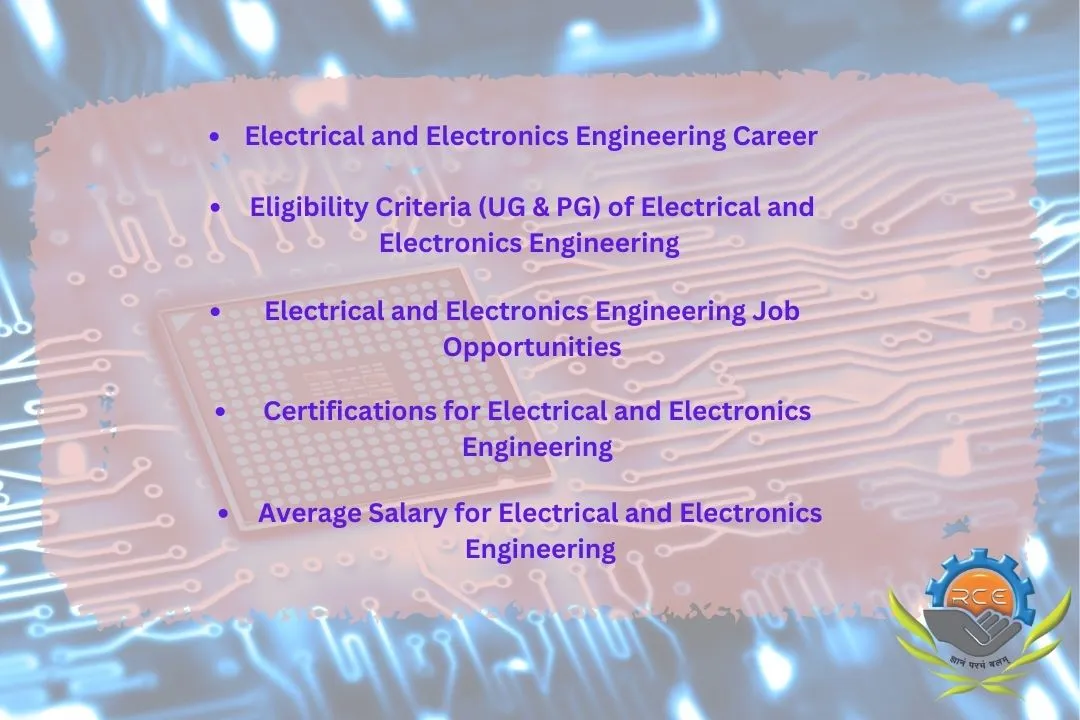
Electrical and Electronics Engineering Career, Job Opportunities and Salary
What is Electrical and Electronics Engineering?
Electrical and Electronics Engineering is a field of engineering that deals with the design and application of electrical systems, as well as the study of electronic devices and systems. Electrical engineers design, develop, and test electrical systems and components such as motors, generators, and power transmission systems.
Electronics engineers design, develop, and test electronic devices and systems such as computer systems, communication systems, and medical monitoring systems. Both fields involve the use of math and science to understand and solve problems related to the production, distribution, and use of electrical power and electronic devices.
Electrical and Electronics Engineering Career
There are many career opportunities available for electrical and electronics engineers. Some of the common job titles in this field include electrical engineer, electronics engineer, and electrical and electronics engineering technician.
Electrical engineers work on a wide range of projects, including the design and development of electrical systems for buildings, power generation and distribution systems, and electrical equipment and devices. They may also work on the testing, maintenance, and repair of electrical systems and equipment.
Electronics engineers design and develop electronic devices and systems such as computer systems, communication systems, and medical monitoring systems. They may also work on the testing, maintenance, and repair of electronic systems and devices.
Electrical and electronics engineering technicians assist electrical and electronics engineers in the development, testing, and maintenance of electrical and electronic systems and equipment. They may also be responsible for setting up and operating test equipment and performing routine maintenance on electrical and electronic systems.
To work in this field, you will typically need at least a bachelor’s degree in electrical or electronics engineering. Some employers may also require a master’s degree or a professional engineer (PE) license. Many electrical and electronics engineers continue their education throughout their careers to stay up-to-date on the latest technologies and techniques in the field.
Here are a few more things you might be interested in knowing about electrical and electronics engineering:
• Electrical and electronics engineers often work in a variety of industries, including utilities, manufacturing, construction, and transportation. They may work for private companies, government agencies, or consulting firms.
• The work of electrical and electronics engineers may involve designing and testing new technologies, such as renewable energy systems or advanced communication systems.
• Electrical and electronics engineers use computer-aided design (CAD) software and other specialized software to create and test designs. They also use a variety of test equipment, such as oscilloscopes and multimeters, to measure the performance of electrical and electronic systems.
• Electrical and electronics engineers often work as part of a team, collaborating with other engineers and technicians to solve complex problems. They may also work with clients to understand their needs and develop solutions to meet those needs.
• Electrical and electronics engineering can be a challenging field, but it can also be very rewarding. Engineers in this field have the opportunity to work on a wide range of projects and to make a positive impact on society by developing new technologies and systems that improve our lives.
Eligibility Criteria (UG & PG) of Electrical and Electronics Engineering
To pursue a bachelor’s degree in electrical and electronics engineering, you typically need to have a strong foundation in math and science, as well as an aptitude for problem-solving. Most colleges and universities have specific admission requirements for electrical and electronics engineering programs, but generally, you will need to have completed high school or its equivalent and have a strong academic record, including good grades in math and science courses. Some colleges and universities may also require that you take the ACT or SAT test as part of the admissions process.
To pursue a master’s or doctoral degree in electrical and electronics engineering, you will typically need to have completed a bachelor’s degree in a related field, such as electrical or electronics engineering, or a closely related field, such as computer science or physics.
You will also need to have a strong academic record and may need to meet other requirements set by the specific program you are applying to, such as letters of recommendation or a personal statement. Some master’s and doctoral programs may also require that you take the Graduate Record Exam (GRE) as part of the admissions process.
Certainly! Here are a few more things you might be interested in knowing about eligibility for electrical and electronics engineering programs:
- Some colleges and universities may have specific high school course requirements for admission to their electrical and electronics engineering programs. These may include courses in math, such as algebra, geometry, and calculus, as well as courses in science, such as physics and chemistry.
- In addition to strong grades and test scores, you may also need to have relevant experience or skills to be eligible for an electrical and electronics engineering program. This could include internships or co-op programs in related fields, participation in math or science competitions, or experience with electrical or electronic systems through hobbies or other activities.
- Some electrical and electronics engineering programs may have competitive admissions processes, with a limited number of spots available each year. In these cases, it can be helpful to have a strong application, including good grades, test scores, and relevant experience, to increase your chances of being accepted.
- If you are interested in pursuing a graduate degree in electrical and electronics engineering, you will typically need to have a bachelor’s degree in a related field and a strong academic record. You may also need to meet additional requirements, such as writing a personal statement or submitting letters of recommendation, as part of the admissions process.
Electrical and Electronics Engineering Job Opportunities
There are many job opportunities available for electrical and electronics engineers, as these professionals are in high demand in a variety of industries. Some of the common employers of electrical and electronics engineers include:
• Utilities: Electrical and electronics engineers may work for electric, gas, and water utilities, designing and maintaining power generation and distribution systems.
• Manufacturing: Electrical and electronics engineers may work in manufacturing industries, designing and improving production processes and equipment.
• Construction: Electrical and electronics engineers may work in the construction industry, designing and overseeing the installation of electrical systems in buildings and other structures.
• Transportation: Electrical and electronics engineers may work in the transportation industry, designing and maintaining electrical systems in vehicles such as airplanes, trains, and automobiles.
• Government agencies: Electrical and electronics engineers may work for government agencies, such as the Department of Defense or the National Aeronautics and Space Administration (NASA), on projects related to defense, space exploration, and other areas.
• Consulting firms: Electrical and electronics engineers may work for consulting firms, providing advice and expertise on electrical and electronic systems to clients in a variety of industries.
• Other: Electrical and electronics engineers may also work for computer and technology companies, hospitals, and other organizations that use electrical and electronic systems.
Certifications for Electrical and Electronics Engineering
There are a number of certifications that electrical and electronics engineers can earn to demonstrate their expertise and improve their job prospects. Some of the common certifications in this field include:
• Professional Engineer (PE) license: To become a licensed professional engineer, you will typically need to have a bachelor’s degree in engineering, pass a licensing exam, and have several years of engineering experience. A PE license is required to sign and stamp engineering plans and offer engineering services directly to the public.
• Certified Electrical Engineer (CEE) certification: The Certified Electrical Engineer (CEE) certification is offered by the Institute of Electrical and Electronics Engineers (IEEE) and is available to electrical engineers who have at least eight years of experience in the field. To earn the CEE certification, you will need to pass an exam and meet other requirements set by the IEEE.
• Certified Electronics Technician (CET) certification: The Certified Electronics Technician (CET) certification is offered by the International Society of Certified Electronics Technicians (ISCET) and is available to electronics technicians who have at least two years of experience in the field. To earn the CET certification, you will need to pass an exam and meet other requirements set by ISCET.
• Other: There are many other certifications available to electrical and electronics engineers and technicians, depending on their areas of expertise and the type of work they do. Some examples include the Certified Electrical Safety Compliance Professional (CESCP) certification and the Certified Control Systems Technician (CCST) certification.
Obtaining a certification can be a good way to demonstrate your knowledge and skills to potential employers and can also help you advance in your career. However, it is important to note that certifications are not always required for employment in this field and may not be necessary for every job.
Average Salary for Electrical and Electronics Engineering
According to data from Glassdoor, the average salary for an electrical and electronics engineer in India is INR 5,71,640 per year. However, this number can vary widely based on factors such as the engineer’s level of experience, education, location, and the specific industry in which they work.
Certainly! Here are a few other things that can affect the salary of an electrical and electronics engineer in India:
• Company size and type: Engineers working for large, multinational companies may earn higher salaries than those working for smaller companies or startups. Engineers working in the public sector may also earn different salaries than those working in the private sector.
• Education and certifications: Engineers with advanced degrees or specialized certifications may be able to command higher salaries.
• Location: Engineers working in large cities or urban areas may earn higher salaries than those working in smaller towns or rural areas.
• Skills and expertise: Engineers who have expertise in specific areas or technologies may be able to command higher salaries.
It’s also worth noting that salary is just one factor to consider when evaluating job offers. Other factors such as the company’s culture, growth opportunities, and benefits can also be important considerations.






